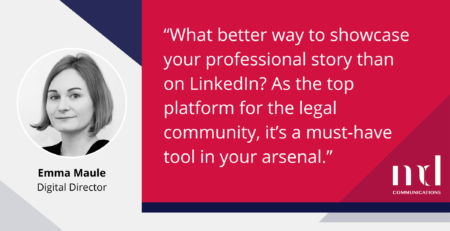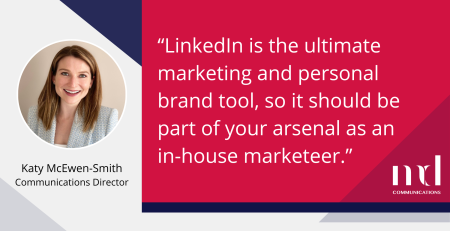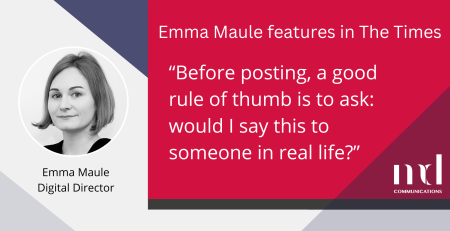When the team and I are helping clients improve their social media presence, we are often asked about things they should avoid doing.
So we’ve pulled together our top five which I hope you’ll find useful.
1. Underestimating the importance of video
This medium has exploded into the world of social media and has overtaken every other type of content marketing, but many firms are not yet fully exploiting its potential.
It’s estimated that 80 per cent of internet traffic is now video content and Google will reward you in search rankings for using video, so creating a business intro video for your landing page is well worth the effort.
Also consider event videos – bringing the party to the people who couldn’t make it. If you’d rather not feature on screen, it’s straightforward to have animated videos created. These are particularly suited for law firms, which often have complex products and services that can be difficult to explain.
2. Trying to sell your services
As a law firm or lawyer, the last thing you should be doing on your social media feed is trying to hawk your services. Social media is about long tail marketing, not the immediate hard sell.
Instead, use the platforms to demonstrate that you are a subject matter expert, and that you’re up to date on current affairs with an interesting comment or opinion. This will enable you to build a community of peers and raise your profile, which should ultimately generate new leads and referrers.
Understanding what is happening in the industry and being able to explain it to other people is helpful and will set you apart from the competition. Via your interesting, thoughtful and useful feed, people will see that you have value, ensuring you’re top of mind when they have a legal issue.
3. Talking too much about the firm’s news
Your feed, especially if you’re using Twitter, should ideally be made up of 30 per cent of your own content – events, blogs, CSR activities, and firm news such as partner hires, and 70 per cent third-party content (other people’s content).
Industry publications and specialist blogs are a great place to start if you’re struggling to find relevant content. If you share a link to someone’s article, make sure you tag the author and publication in your post – this will help to boost engagement.
4. Not listing all your social media platforms prominently on your website
Most firms have resolved this issue, but I still find some examples where the website appears to be completely divorced from any social media presence, even to the extent of using different branding.
The icons for your social platforms should be on the homepage – either at the top or bottom (preferably both, so they can be seen wherever the user is on the page) – and also embedded in the footer so users can navigate to your feeds from any page of the site. Social feeds should also follow the same brand guidelines as your website in terms of colour and imagery.
5. Having an excessive number of social media platforms
Too often I’ll be asked to carry out a review and, with a bit of googling, find various extraneous Twitter feeds or an old YouTube account. While these might post the occasional tweet, they can easily seem a bit sad or neglected if they only reach low follower counts and views.
Firms that I challenge on this frequently point to a ‘segmentation strategy’, which is all very well, but it can easily get out of control: sectors, practice areas and topics tend to keep segmenting into ever smaller topics, all of which would require a separate account.
Unless you are a huge law firm with a heavily-resourced marketing department, it is inevitable that some of your five, eight, or 20 feeds will suffer. My advice is to carry out a periodic audit every year or so, and ask – are these really necessary? Do they spark joy? If not, be ruthless: close the accounts, direct people to the main feed, and use a hashtag (rather than setting up a separate account) if you want to post about something specific.
Whether you’re looking to get started, want a social media audit or want expert advice on a new social media campaign, the team at MD Communications can help. We offer social media advice and training courses tailored to law firms and individuals. We also have a guides for law firms and lawyers on getting the most from Twitter and LinkedIn.












